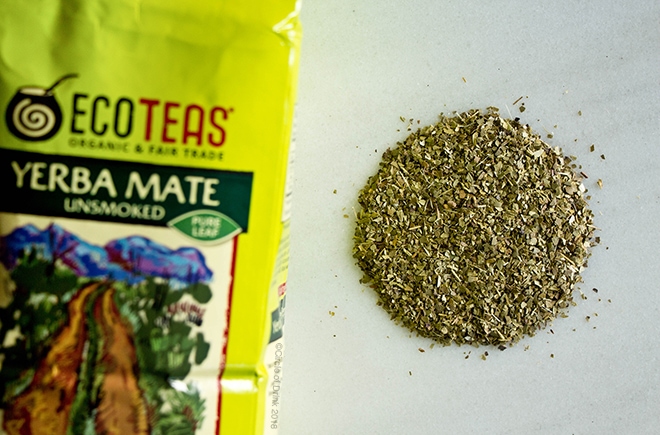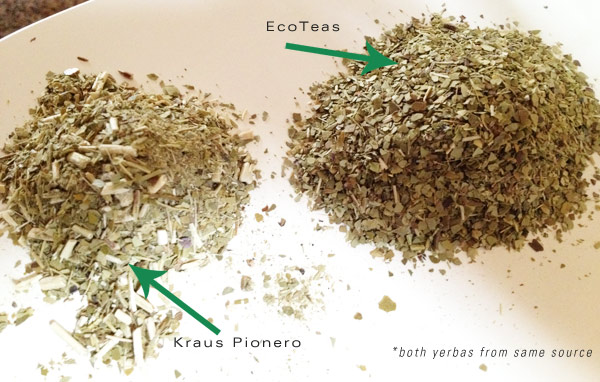
Eco Teas— 3.15 of 5 palos — reviewed 5/3/2012
Type: Traditional, Unsmoked
Region: Misiones, Argentina
Company: Mate Revolution Inc.
Gourd Type Used: Ceramic
Description:
This was the first yerba that I purchased from a United States store after returning from my second tour in Argentina and Uruguay in Spring 2010. It was significantly cheaper than the only other option, Guayakí, so I purchased a pound. Albeit my mate palate wasn’t yet developed even remotely as it is now, over 2 years later of daily mate drinking, I was pretty indifferent to this yerba. I remember calling it “smoky,” though this is declared an “unsmoked” mate. Perhaps I was picking up on what I can now recognize as some “Gaucho Mate” properties, in terms of robustness and initial bursts of flavors.
Now, years later, and after spending significant time in Argentina, drinking well over 30 varieties of yerba from Brazil to Uruguay to Buenos Aires, I am still left somewhat, but not totally, unimpressed with this yerba. Though, I can appreciate the subtle and refined taste of it much better now.
Eco Teas sources this yerba from the Kraus family of Oberá and San Ignacio Provinces of Misiones, Argentina. However, the taste, texture, and composition of this yerba is significantly different from the Kraus labels sold in Argentina and other parts of the world: Orgánica, Silvestre, Pionero, and Gaucho. The main difference is cut: Eco Teas contains little to no palos, has a darker hue which may signify that it’s aged less, and has a smaller, more Gaucho-esque cut; it essentially looks more polished and washed than the more rugged, rustic, and bohemian Pionero or Silvestre.
Mind you, Eco Teas also offers a “Kraus” label of yerba, but the exact differences between their “Kraus” label, which seems to be a traditional yerba, and the four Kraus labels sold in Argentina, are still unknown to me. I contacted Eco Teas about it, but never received an answer (I’m currently in contact with Milton Kraus himself, so expect more details on this later).
Eco Teas is apparently processed differently, resulting in a different taste, cycle length, and overall experience (perhaps, in Eco Teas’ words, a “better-suited,” more mellow taste for the American palate). It’s definitely more mellow, but I find it more astringent and tarty than the Kraus lines sold in Argentina. I prefer Eco Tea less than any of the Kraus lines except the Silvestre, which includes mint, and isn’t a yerba that I drink too often (I’m more of a cimarrone sort of dude).
Explore the history of Ecoteas >>
With that said, I’m super happy that Eco Teas sources their yerba from the Kraus family. With their combined efforts of producing a USDA Organic and Fair Trade yerba, they are already on the summit of sustainability, socially conscious business, and, simply, just doing the right thing in the world. I’m proud of this company and have a lot of respect for what they’re doing. With other major mate companies out there, one of which is regarded as the largest in the world, practicing, let’s say, “questionable” growing methods and using various non-organic fertilizers in their fields, companies like Eco Teas and Guayakí are setting the bar for keeping mate organic and fair trade here in our country.
Cut 2.75 palos
This is an interesting, perhaps even confusing cut: It has Gaucho properties in that it’s finely ground and contains small, splinter palo, but it has absolutely no polvo; very washed and “clean” sort of composition. Again, I think Eco Teas is taking the “American Palate” into consideration here, making a safe play by removing — in what I consider a vital ingredient — the polvo. With no polvo, the mate is less dimensional and the viscosity of the infusion is severely weakened (perhaps the nutritional value is compromised as well); you lose the malt-like flavor profiles which I believe balances not only the taste, but the environment of the yerba inside the gourd. The polvo acts as a sort of binding agent that any experienced cebador, or server, knows how to play with in order to extend the life, or cycle, of the yerba.

Body/Texture/Taste 3.75 palos
Nice medium body. Good character and initial gaucho-like strength and boldness. Has an astringent kick that I’m not fond of at times, probably due to it being less aged. Slight hints of Canarias. Toasted bread notes.
Nose 2.85 palos
Beautifully clean nose with sweet subtle hints. Without the polvo, the fragrance is less exposed; but nonetheless, this yerba has quite pleasant bouquet.
Finish 3.50 palos
Balanced finished. Some astringency, but not too overwhelming and fierce (as La Tranquera). Soft spoken, but not silent (as Playadito). Good harmonization of flavors. Some depth.
Cycle 2.90 palos
Decent short-to-mid cycle. Good green-teaing properties. Lack of polvo increases the speed of cycle; good for business, as you’ll use more yerba in the long run, but bad for overall experience of taste and cycle length. For those that prefer a light, more green-teaish yerba, then this won’t be a problem, as you can continue to drink through the semi-washed to completely washed transitions (what I refer to as “green-teaing”).
Overall: 3.15 palos
Recommendation
I have a newfound respect for this yerba, after revisiting it 2 years later. The company values and comparatively low cost of the yerba, qualifiy it as one of the best yerbas in North America (albeit, there are only a few companies on the market). If you live in the States, this yerba should be added to your mate library. What it lacks in cycle life and the somewhat weak cut, it makes up for in a snappy, zippy, tasty experience for the first several cycles, before it sharply falls into a green teay concoction.
Eco Teas is closer on the scale to a Gaucho Mate than Guayakí —somewhat in between Guayakí Traditional and Mate Factor Traditional. Though this isn’t one of my favorite yerbas and I think that the cut and composition of it was played too safely, I recommend that you give it a shot, especially if you want to easily try out some mate without having to order it online. Eco Teas is sold throughout the States in Trader Joe’s and other health markets.
Learn more about the different types and cuts of yerba mate >>



